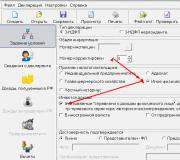Disabling Protect protection in Yandex Browser. How to remove Yandex Defender from your computer: step-by-step instructions Protecting your browser settings
Software from unscrupulous programmers is often found on the Internet. Many people have encountered the fact that after installing some program, home pages and even settings change in browsers.
Many users, due to ignorance, are not aware of these changes or do not see anything dangerous in them. But I assure you that there is nothing good about changes that are made on a computer without the user’s knowledge. Therefore, in this article I will tell you about a program that deals with browser protection from such clever programs.
Browser protection. Browser Manager.
In one of the previous articles, I wrote that even the simplest method should not be neglected when protecting your computer. Then I wrote about using the utility Unchecky. Today we’ll talk about a program that provides browser protection installed on your computer. The program is called Browser Manager. It was written by Yandex programmers.
You can download Browser Manager from this link.
The Browser Manager's job is to protecting browser settings from unauthorized changes. In other words, no one can change your browser settings without your knowledge. At the same time, the program itself remains neutral and does not impose its settings. Yandex has already touched on the topic of browser protection earlier. Some of you, my readers, probably remember their program, which was called Yandex.Defender. Yandex.Defender protected the browser on which Yandex elements (Yandex bar) were installed. A Browser Manager is not limited only to protecting browsers on which Yandex “criminal” elements are installed. Here's what the Yandex developers say their brainchild can do:

As you can see, the program is very useful and simple. Installing the program is standard and very simple, so I won’t dwell on it. After installing the program, a white circle with a dark tick inside will appear in the tray.

Clicking on it will open a window like this.

Here I recommend enabling all options and checking all the boxes. This way the program will protect your browser more effectively. In the same window there is a link “Setting up search and home page”. Clicking on it will open a window that displays information about browsers, the search engines they use, home pages and the default browser.

By the way, in this window it is very convenient to set the home page for each browser in the system.
Browser Manager along with Unchecky provide good protection against the factor " newbie user", when the user himself, due to his poor knowledge in the field of computers and the Internet, opens all the doors for the penetration of malware into the system.
For me, these two programs have become mandatory software on the computers of my relatives, friends and clients. I am sure it will also bring you only benefit. I'll wrap it up here and hope that now browser protection on your computer will be impenetrable.
Translation: Alexander Ryabov
1. General settings and search engines
One of the first lines of defense against virus infections and privacy threats that plague us online lies in our web browsers. This series of articles is designed to help you strengthen your browser against all types of online problems.
However, it is worth noting that even if your main concern is only about privacy, we highly recommend that you still read the sections regarding security. Preventing your computer from contacting potentially dangerous sites and helping you avoid malware plays a very important role in maintaining your online privacy on the Internet. So protecting your privacy actually requires that you maintain your security as well.
Please note that in addition to the general guidelines, you will also need to review the sections that apply to the specific web browser you are using. You don't really even need to worry about the other sections. Additionally, please note that all instructions are given on the assumption that no other configuration changes have been made. All browsers were installed with default settings and then configured. Additionally, unless otherwise noted, any instructions offered apply to all browsers in the categories listed. Every time a certain browser needs special settings, this will be noted.
1. General browser settings
If you, like most people, use Adobe Flash, then you will need to make some changes to the settings. Regardless of which browser you use, you should ensure that your Flash player settings do not allow third-party cookies. If you are running Windows Vista Windows 7 or Windows 8 (8.1), do this by going to Control Panel on your computer.
From there, go to the "System and Security" section. If you are running Windows XP, you should go to Control Panel and make sure it is displayed in "Classic View". At this step you should see the "Flash player" icon. Click on it. On the "Storage" tab, make sure that the "Block all sites from storing information on this computer" option is selected. Also, on the "Advanced" tab, make sure that the "Allow Adobe to install updates" option is selected.
In addition, it is important to know that Java is constantly used to install malware on users' computers. Plus, the Java plugin isn't even necessary to use most sites. So, if the Java plugin is installed in your browser, our advice to you is to remove it if you don't need it. Additionally, if you have removed Java completely from your computer, which we recommend doing unless you are actively using it, you should also use the built-in Windows search to find the file "npDeployJava1.dll" on your C drive, and if it exists , delete it. For some reason this file was not removed by the Java uninstaller.
If Java is required for programs installed on the system, we recommend that you read the instructions
Additionally, if there are any plugins that you are not using, we advise you to remove them as well. They may jeopardize your safety. To remove unwanted plugins you can use avast! Browser Cleanup or Auslogics Browser Care, or use tips for checking and configuring web browser plugins.
2. Use privacy-friendly search engines
The Google search engine records your search history and persistently follows you. Many other popular search engines do the same. Therefore, we suggest you use an alternative search engine. One of the best anonymous search engines is called . This search engine allows you to search using Google, but it blocks Google's ability to track you.

It's not as powerful a search engine as Google's original search engine, but it's definitely a useful tool for anonymously searching for information. The same company that created StartPage also created a search engine called . It collects its results from many other sources and thus can be even more useful than StartPage. Both search engines have been certified by an independent third party as search engines that do not record the visitor's IP address or use tracking cookies.
Another very good search service is called . This search engine also does not record any information about your search. DuckDuckGo generates its search results based on a selection from many sources. It also displays answer options for the question you ask at the very top of the results page. In addition, in the settings (menu More > Settings > Results > Site icons) you can display the WOT security rating without installing the plugin itself.

In terms of security and privacy, DuckDuckGo is a very useful search engine.
To be continued...
In the next article, we'll look at how to improve the security and privacy of Chromium-based web browsers (Google Chrome, Comodo Dragon, and SRWare Iron).
Found a typo? Highlight and press Ctrl + Enter
A small free utility, Browser Manager, protects web browsers from changing or replacing the home page in the hosts file, installing an alternative search engine, adding unnecessary commands to shortcuts, and forcing the opening of non-target tabs. It is precisely these “pranks” that make malware different. Often, after his actions, in order to return the settings, you need to spend more than one minute of time. The Yandex application will protect you from such changes; it works in the background and reminds you of its presence only with a tray icon.
Possibilities:
- protection against changes to the search engine and home page;
- hosts file analysis;
- support for popular web browsers;
- warning when adjusting settings;
- work in the background.
Working principle:
The utility is installed quite simply - after clicking on the “Install” button, the application itself recognizes installed programs for surfing the Internet and displays them in the general list. During testing, the browsers used on the computer were Mozilla Firefox, Opera and Internet Explorer.
To call up the manager settings, you need to click on its shortcut in the tray and select “Settings”.
The menu is Russified and it’s quite easy to navigate. The default settings have the optimal value; there is no need to change anything.
Pros:
- manage permissions for plugins directly from the interface;
- maintaining a history of adjustments;
- menu in Russian.
Cons:
- when making some personal settings, the manager mistakenly perceives them as malicious code (for example, when the program is running, it is impossible to create a shortcut with several tabs);
- The utility does not protect against malware, only against adjustments to browser settings.
I hope we have answered the popular question “Browser manager - what is this application and why is this program needed?” The product from Yandex is really useful, especially if you often visit various unfamiliar resources.
Is this Browser Manager program necessary for experienced users? Most likely yes. The utility uses almost no resources, and the dangerous code it protects against can easily penetrate the system even from trusted portals.
Analogues:
- AdwCleaner - malware cleaning software;
- SUPERAntiSpyware Free - browser settings blocker.
Indeed, modern antivirus programs offer such a range of functions that, in theory, browser protection should be present there a priori, but this is not always the case. In fact, the task of an antivirus is to prevent malware from getting onto your hard drive, and therefore it tirelessly and carefully monitors downloads, downloaded files and external connections. At the same time, what you are doing in the web browser environment often falls out of his attention.
It turns out that all passwords and logins, account and credit card information, access to websites and accounts on social networks - all the information that you enter in the fields on the pages opened in the browser is at risk of being stolen. Along with money, subscribers and reputation. It turns out that not everyone internet antivirus copes with his duties 100%
Which antivirus should I use?
The Qihoo 360 company considers one of its most important tasks to be the protection of users in the web space where we spend more and more time every day. That's why 360 Total Security, our flagship product, automatically prompts you to install 360 Internet Security browser protection.
This is an almost weightless plugin that is built into any modern web browser and automatically monitors sites that you enter on the command line. Even before you see the portal content, the program warns about potential dangers - keyloggers, phishing sites, and other suspicious add-ons.
With this add-on, you can safely make online purchases, enter card numbers and PIN codes, and send personal and confidential information.




